Cherry Potts's Blog, page 18
February 13, 2014
The Historical Birthday-Tea Party 13th February
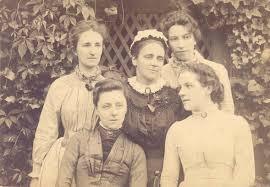
Constance in the middle, with the staff of Westfield
Once more, no specific birthday, so skipping ahead to the 19th for which there are several, let’s make the acquaintance of Constance Maynard, 19/2/1849-1935 was a pioneer of women’s education and the first mistress of Westfield College. She worked at various times and ladies colleges with other education pioneers Frances Dove, Louisa Lumsden, Ann Dudin Brown and Caroline Cavendish. Brought up deeply religious she wrote an autobiography and kept a diary, in which she talks (somewhat obliquely) about her many women friends, but also acknowledges that was she feels is (sexual) love. She had passionate relationships with two of her students, Margaret Graham Brooke and Marion Wakefield.
And yet, yet, – I loathe to write it down, – the whole was spoilt and devastated by love, by what psychoanalysts call by highly disagreeable names, such as a “thwarted sex-instinct”. There was something within me which seemed to have a foremost & impervious claim, a hunger which must be satisfied, whatever food was on offer.


The Historical Birthday-Tea Party

Constance in the middle, with the staff of Westfield
Once more, no specific birthday, so skipping ahead to the 19th for which there are several, let’s make the acquaintance of Constance Maynard, 19/2/1849-1935 was a pioneer of women’s education and the first mistress of Westfield College. She worked at various times and ladies colleges with other education pioneers Frances Dove, Louisa Lumsden, Ann Dudin Brown and Caroline Cavendish. Brought up deeply religious she wrote an autobiography and kept a diary, in which she talks (somewhat obliquely) about her many women friends, but also acknowledges that was she feels is (sexual) love. She had passionate relationships with two of her students, Margaret Graham Brooke and Marion Wakefield.
And yet, yet, – I loathe to write it down, – the whole was spoilt and devastated by love, by what psychoanalysts call by highly disagreeable names, such as a “thwarted sex-instinct”. There was something within me which seemed to have a foremost & impervious claim, a hunger which must be satisfied, whatever food was on offer.


February 12, 2014
The Historical Birthday-Tea Party 12th February
Once more I am short of a specific birthday to celebrate, so back to the seventeenth century and to Frances Apsley 1653–1727.
Frances was the object of affection of a youthful Mary Stuart, who became that strange binomial monarch ‘William&Mary’, or more correctly Mary II of England. Mary was older sister to Queen Anne, and they both had a bit of a crush on Frances who was nine years older than Mary. There is no extant evidence that Frances reciprocated, but she clearly entered into the game of assumed names and ‘marriages’ the girls played or Mary’s side of their correspondence would not have been so protracted.
Mary and Anne were inclined to jealousy where Frances was concerned and a certain amount of out-doing each other became part of the letter writing. A particularly fine example of Mary’s style is shown in the following, written well before her marriage and removal to the Netherlands:
I may if I can tel you how much I love you but I hope that is not doubted I have give you proves enufe if not I will die to satisfy you dear dear husban if al my hares were lives i wold lose them al twenty times over to sarve of satisfie you… I love you with a flame more lasting than the vestals fire thou art my life my soul my al that heaven can give deaths life with you without you death to live. What can I say to persuade you that I love you with more zeal than any lover can I love you with a love that ner was know by man I have for you excese of friandship more of love then any woman can for woman and more love then even the constantest lover had for his mistress. You are loved more than can be exprest by your ever obedient wife vere afectionate fiand humbel sarvent to kis the ground where once you go to be your dog in a string your fish in a net your bird in a cage your humbel trout.
Despite the eccentric (even for the time) spelling and lack of punctuation, I think a girl would be flattered to get a letter like that. Frances did eventually marry, but not until she was twenty-nine, which is rather old for the time – Mary was married at thirteen.
So yes, I think Frances gets her invitation, if only so that we can find out what it was that had two future monarchs vying for her attention…


The Woman Who Loved the Moon and other stories
 For LGBT History Month, here’s an edited version of the review I wrote for Short Review of the fantasy/ scifi/ horror collection from 1981 by Elizabeth A. Lynn
For LGBT History Month, here’s an edited version of the review I wrote for Short Review of the fantasy/ scifi/ horror collection from 1981 by Elizabeth A. Lynn
Lynn is one of the earliest fantasy writers to include same-sex relationships in her writing as a matter of course.
Author of A Different Light, The Dancers of Arun, The Northern Girl (a favourite book of mine) and Watchtower (which won a World Fantasy Award as did the title story of this collection.)
The collection hosts traditional fantasy and science fiction tales which are given a lift by strong writing, realistically strong female protagonists, and satisfyingly matter-of-fact lesbian characters.
“Explain need for Empire at this Time”
I first read this collection when it was originally published back in 1981, an important year for me, coming out and on the lookout for (to be honest, any) books that were positive about lesbians. As a convinced fantasy enthusiast I fell on the work of Elizabeth A Lynn with delight. Thirty plus years later, (long enough to have forgotten all but the general shape of the stories, with the exception of the title story which haunted me for years) these stories have worn well, although I can see their faults more. Lynn does herself no favours with her introductory paragraphs, which I quickly learnt to avoid reading, best to dive straight in to the fantasy than hear how come it took so long to find a publisher, or why she got saddled with a different title (although the variant titles thing is quite interesting!).
As with all collections there are strong, and less convincing stories, and it is when Lynn sticks to fantasy that she is at her best – it is as though an outlandish setting gives her permission to really explore psychological and emotional complexity. The horror stories (and some of the SF) in this collection are thin to the point of transparency, and feel thrown together, whereas the fantasies engage and challenge – for this shortened version of the review I’m sticking to the positive – this IS one of the books I would save from a burning building, despite its faults.
The first story Wizard’s Domain, starts solidly with treachery and an inventive punishment followed by a forgiveness of the perceived crime, and the forgiveness of the punishment, which we are set up to not trust. Lynn puts her wizards through it: Magic is not easy, and she can be both lyrical and brutal.
The Gods of Reorth is one of those ‘the natives think were gods but we are from another planet’ stories that feel very 50’s in content, but Lynn throws an unconventional spanner into the story with her indignant goddess/alien, who doesn’t see why she should do what the leaders back at home want for this planet, but hesitates too long and has to stand by and let her lover be killed. She gets a subtle, clever revenge. One of the best stories in the book.
The Saints of Drimman takes an anthropologist exploring religious ecstasy one step too far, and I dream of a bird, I dream of a fish, is a moving bit of mother-love overcoming odds with casually plausible bio-science.
Things really pick up with The Dragon Who Lived in the Sea, which makes an unexpected tragedy from fearlessness taught to a child, a lovely thoughtful story, chock full of tension and disappointment.
Mindseye is another explorers-on-an-alien-world story, but it cleverly explores what we mean by human; and how open we can be to difference, or not.
In Don’t Look at Me, a daughter uses sleight of hand to almost gets away with murder, and you find yourself wishing she had.
Jubilee’s story (the original title Gimme Shelter was rejected by the publisher as obscure) throws in warring brothers, childbirth and abuse, and is one of those stories that you spend time thinking about what came before and what might come after.
The final and title story, The Woman Who Loved the Moon brings together lots of mythological tropes: three sisters, goddesses peeved at being compared unfavourably to mortals, kingdoms under the hill where time moves differently, and magical mirrors. Lynn draws you in with the rhythms of the language and even though you are silently protesting this isn’t going to end well, don’t do it, Kai, Lynn allows you to believe it might – just – maybe, be possible to love the moon, and astonishingly be loved back. It is one of the saddest stories I’ve read, and while it doesn’t move me the way it did thirty years ago it deserved the Word Fantasy Award it won.


February 11, 2014
The Historical Birthday-Tea Party 11th February
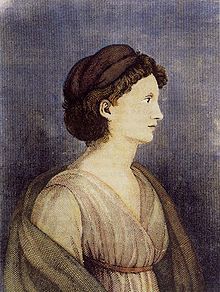 Karoline von Günderode 11 February 1780 – 26 July 1806 romantic poet, her works often had strong heroic women in the central role, and was critical of traditional gender attitudes.
Karoline von Günderode 11 February 1780 – 26 July 1806 romantic poet, her works often had strong heroic women in the central role, and was critical of traditional gender attitudes.
I have to say she behaved a bit like an opera heroine, and this doesn’t strike me as entirely a good thing – Jane Austen would have had comments to make about sensibility.
I’ve often had the unfeminine desire to throw myself into the wild chaos of battle and die. Why didn’t I turn out to be a man! I have no feeling for feminine virtues, for a woman’s happiness. Only that which is wild, great, shining appeals to me. There is an unfortunate but unalterable imbalance in my soul; and it will and must remain so, since I am a woman and have desires like a man without a man’s strength.
Sounds good doesn’t it, but she had an affair with a married man Georg Friedrich Creuzer, who divorced his wife to be with her. Unfortunately, persuaded by his friends that Caroline was unsuitable, he left her. (Or depending on which version you go by, he wouldn’t divorce his wife). As a result of the stress he got ill, and Caroline, believing he was dying (or furious he wouldn’t divorce his wife…), killed herself… Georg survived the illness (if there was one).
Actually, not sure why I’m including her, I’m writing this and thinking, idiot! But there you go, idiots abound, and sometimes they can be fun to be around, briefly.
I think I would be delighted if she declined the invitation, I’d be having to keep an eye on her the whole time, and keep counting the knives: not restful.


The Historical Birthday-Tea Party 10th February
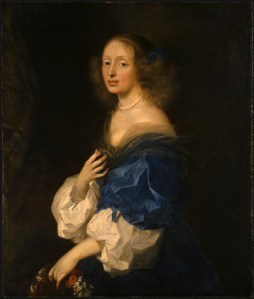 No official birthday holder for today, so here’s someone who’s birthdate we do not know: Ebba Larsdotter Sparre (1629 – 19 March 1662) lover of Queen Christina of Sweden.
No official birthday holder for today, so here’s someone who’s birthdate we do not know: Ebba Larsdotter Sparre (1629 – 19 March 1662) lover of Queen Christina of Sweden.
Ebba was a celebrated beauty nicknamed La belle comtesse.
Christina doted on Ebba, always drawing attention to her beauty. When she abdicated and left Sweden, she wrote Ebba passionate letters.
Never doubt the truth of this. and believe that wherever I may be in the world you have there someone who belongs to you as much as ever. But is it possible that you still remember me? Am I still as dear to you as I used tobe? Or did I deceive myself when I thought that I was the person you loved most in the world. Ah if that is true, do not undeceive me. Leave me my error, and don’t be jealous of my imagined happiness, which allows me the belief that I am dear to the most amiable person in the world.
Christina tried to get Ebba to visit her in Germany, and even tried to see her when she was in Sweden briefly, but these plans were thwarted by Ebba’s family.


February 9, 2014
The Historical Birthday-Tea Party 9th February
 Amy Lowell
Amy Lowell
February 9, 1874 – May 12, 1925
the embodiment of the new liberated woman, … unlimited faith in her own capability
God made me a business woman, and I made myself a poet
Towards the end of her short life Amy had a relationship with Ada Dwyer Russell, and wrote several poems for her.
The Temple
Between us leapt a gold and scarlet flame.
Into the hollow of the cupped, arched blue
Of Heaven it rose. Its flickering tongues up-drew
And vanished in the sunshine. How it came
We guessed not, nor what thing could be its name.
From each to each had sprung those sparks which flew
Together into fire. But we knew
The winds would slap and quench it in their game.
And so we graved and fashioned marble blocks
To treasure it, and placed them round about.
With pillared porticos we wreathed the whole,
And roofed it with bright bronze. Behind carved locks
Flowered the tall and sheltered flame. Without,
The baffled winds thrust at a column’s bole.
The Taxi
When I go away from you
The world beats dead
Like a slackened drum.
I call out for you against the jutted stars
And shout into the ridges of the wind.
Streets coming fast,
One after the other,
Wedge you away from me,
And the lamps of the city prick my eyes
So that I can no longer see your face.
Why should I leave you,
To wound myself upon the sharp edges of the night?
Anticipation
I HAVE been temperate always,
But I am like to be very drunk
With your coming.
There have been times
I feared to walk down the street
Lest I should reel with the wine of you,
And jerk against my neighbors
As they go by.
I am parched now, and my tongue is horrible in my mouth,
But my brain is noisy
With the clash and gurgle of filling wine-cups.
Ada edited posthumous collections of Amy’s poem, including this:
Sappho would speak, I think, quite openly
And Mrs Browning guard a careful silence,
But Emily would set doors ajar and slam them
And love you for your speed of observation
What’s O’clock 1925: The Sisters st2
Tell me
Was Venus more beautiful
Than you are
When she topped
The crinkled waves
Drifting shoreward
On her plaited shell
Was Botticelli’s vision
Fairer than mine
And were the painted rosebuds
He tossed his lady
Of better worth
Than the words I blow about you
To cover your too great loveliness
Amy would be good company I think, full of brio and delight. She gets her invitation, Ada too, obviously.


February 8, 2014
Lewisham Library LGBT Lesbian takeover
We had a great night at Lewisham Library on Thursday. A substantial crowd, a relaxed atmosphere and some great writers. The first of many events for LGBT History Month, it was a diverse and entertaining evening.
V.A Fearon read from her novel The Girl With the Treasure Chest, about gang negotiator Dani, and her first meeting with lover Marie;
Kate Foley read us some varied poems from several collections covering everything from bedroom tax to first smoochy dance at the Gateways*
Cherry Potts stuck up for Helen of Troy in her story Behind the Mask, from Mosaic of Air
and V.G. Lee‘s heroine struggled to be a proper card-carrying lesbian in the teeth of straight friend Deirdre’s best attempts to scupper her.
*Anyone under the age of thirty may be mystified by the Gateways. If you want to know more, come along to The Story Sessions on 19th February and listen to Clare Summerskill.



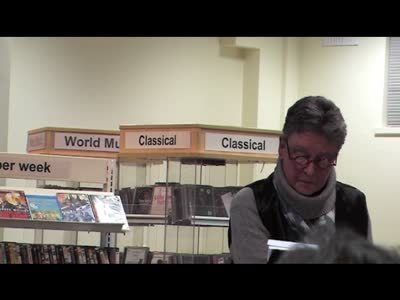

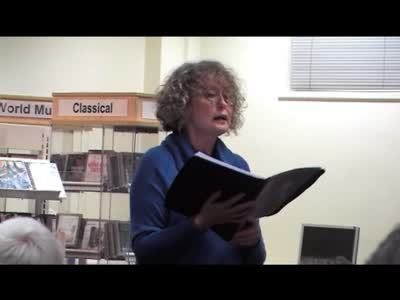
Lewisham Library taken over by Lesbians…
Here are some photos from Thursday’s LGBT History Month event at Lewisham Library, featuring me, Kate Foley, V.A. Fearon and V.G. Lee.
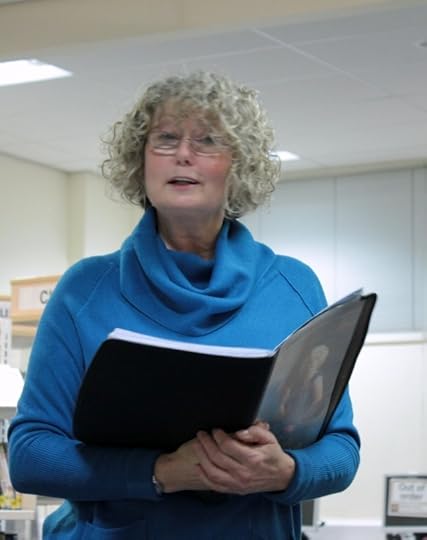
V G Lee copyright Cherry Potts 2014
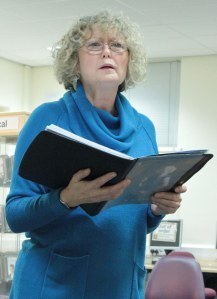
V G Lee copyright Cherry Potts
I really wanted to photograph the lovely audience too, but had too many other things on my mind. But imagine a library stuffed full of women, plus a couple of men, and a baby.
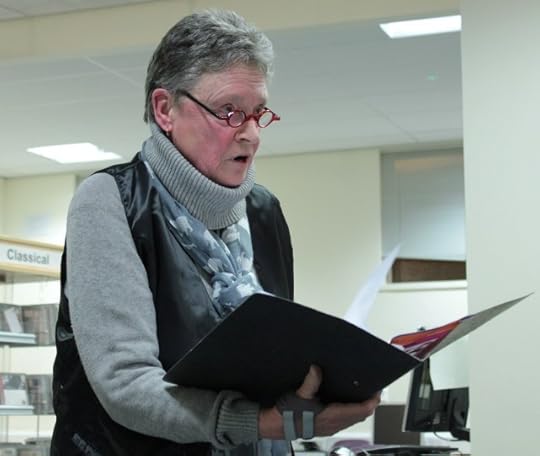
Kate Foley copyright Cherry Potts 2014
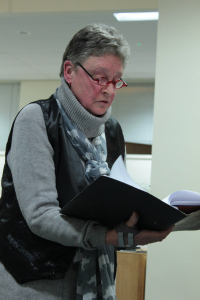
Kate Foley copyright Cherry Potts 2014
I was really, really pleased with the atmosphere and my fellow readers did us proud – video will go up as soon as I’ve edited it.

V A Fearon Copyright Cherry Potts 2014


The Historical Birthday-Tea Party 8th February
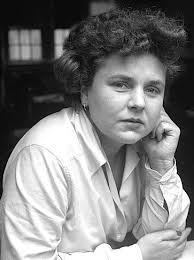 Today’s birthday girl is multiple award-winning poet Elizabeth Bishop (February 8, 1911 – October 6, 1979) “one of the most important American poets” of the twentieth century.
Today’s birthday girl is multiple award-winning poet Elizabeth Bishop (February 8, 1911 – October 6, 1979) “one of the most important American poets” of the twentieth century.
Elizabeth was great friends with Marianne Moore who mentored her while she was studying at Vassar. Elizabeth travelled widely, often with female companions, one of whom Marjorie Stevens, she lived with from 1943 until 1947.
All my life I have lived and behaved very much like the sandpiper just running down the edges of different countries and continents, looking for something.
In 1951 a further season of travelling, on a fellowship, took her to Rio de Janeiro where she met Lota de Macedo Soares with who she lived until Lota’s death in 1967.
I was made at right angles to the world
and I see it so. I can only see it so.
After 1970 she then travelled again this time with Alice Methfessel.
Close, close all night
the lovers keep.
They turn together
in their sleep,
Close as two pages
in a book
that read each other
in the dark.
Each knows all
the other knows,
learned by heart
from head to toes
Elizabeth was an alcoholic so it would definitely have to be a tea party.
Well, the cat is flourishing and gets more spoiled and more beautiful every day. His whiskers measure, from tip to tip, including his mouth and nose, of course, ten inches, pure white whale bone.





